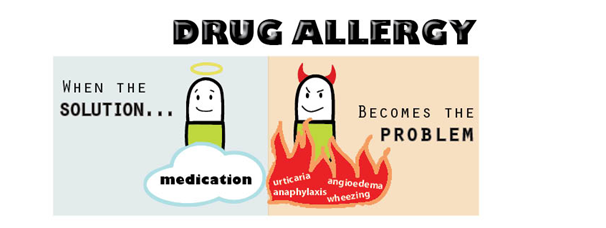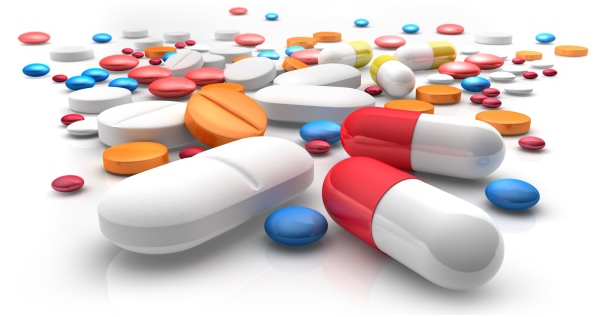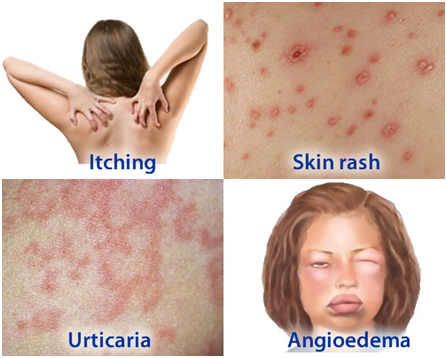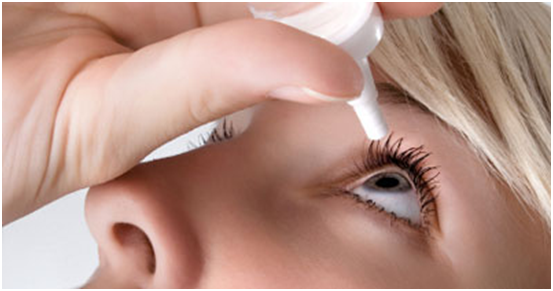Drug Allergy

Drug allergies are a group of symptoms caused by an allergic reaction to a drug (medication). The chances of developing an allergy are higher when you take the medication frequently or when it is rubbed on the skin or given by injection, rather than taken by mouth.
Causes
Adverse reactions to drugs are common. Almost any drug can cause an adverse reaction. Only about 5% to 10% of these reactions are due to an allergy to the medication. Reactions range from irritating or mild side effects such as nausea and vomiting to life-threatening Anaphylaxis.
A true drug allergy is caused by a series of chemical steps in the body that produce the allergic reaction to a medication.
The first time you take the medicine, you may have no problems. However, your body’s immune system may produce a substance (antibody) called IgE against that drug. The next time you take the drug, the IgE tells your white blood cells to make chemical called histamine, which causes your allergy symptoms. A drug allergy may also occur without your body producing IgE. Instead, it might produce other types of antibodies, or have other reactions that do not produce antibodies.
Most drug allergies cause minor skin rashes and hives. Serum sickness is a delayed type of drug allergy that occurs a week or more after you are exposed to a medication or vaccine.
Penicillin and related antibiotics are the most common cause of drug allergies.
Other common allergy-causing drugs include:
Anticonvulsants
Aspirin and non-steroidal anti-inflammatory medications, such as ibuprofen
Insulin (especially animal sources of insulin)
Iodinated (containing iodine) x-ray contrast dyes (these can cause allergy-like reactions)
Sulfa drugs
Chemotherapy

Most side effects of drugs are not due to an allergic reaction. For example, aspirin can cause nonallergic hives or trigger asthma. Some drug reactions are considered “idiosyncratic.” This means the reaction is an unusual effect of the medication, not due to a predictable chemical effect of the drug. Many people confuse an uncomfortable, but not serious, side effect of a medicine (such as nausea) with a true drug allergy, which can be life threatening. If you take ACE (angiotensin converting enzyme) inhibitors for high blood pressure, you may develop a cough or facial and tongue swelling.
Symptoms
In many cases, it can be difficult to determine if the reaction is due to the medication or something else. This is because your symptoms may be similar to other conditions.
The most frequent types of allergic symptoms to medications are:
1
Hives
2
Skin rash (common)
3
Wheezing
4
Mild sensitivity to light (Photophobia)

5
Itching of the skin or eyes (common)
6
Swelling of the lips, tongue, or face

Symptoms of anaphylaxis include:
Abdominal pain or cramping
Confusion
Diarrhea
Difficulty breathing with wheeze or hoarse voice
Dizziness
Fainting, light-headedness
Hives over different parts of the body
Nausea, vomiting
Rapid pulse
Sensation of feeling the heart beat (palpitations)

Diagnosis
At the time of acute drug reaction an examination may show:
Decreased blood pressure
Hives
Rash
Swelling of the lips, face, or tongue (angioedema)
Wheezing
Your allergist will want to know:
When symptoms began
A description of your symptoms
How long the symptoms lasted
Any other medications taken during this time, including over-the-counter drugs
Skin testing may help diagnose an allergy to penicillin-type medications. There is no good skin or blood tests to help diagnose other drug allergies.
If you have had allergy-like symptoms after taking a medicine or receiving contrast (dye) before getting an x-ray, your health care provider will often tell you that this is proof of a drug allergy. You do not need more testing.
Treatment
The goal of treatment is to relieve symptoms and prevent a severe reaction.
Treatment may include:
Antihistamines to relieve mild symptoms such as rash, hives, and itching
Bronchodilators such as albuterol to reduce asthma-like symptoms (moderate wheezing or cough)
Corticosteroids applied to the skin, given by mouth, or given through a vein (intravenously)
Epinephrine by injection to treat anaphylaxis
The offending medication and similar drugs should be avoided. Make sure all your health care providers — including dentists and hospital staff — know about any drug allergies that you or your children have.
Identifying jewellery or cards may be recommended.
Occasionally, a penicillin (or other drug) allergy responds to desensitization, where you are given larger and larger doses of a medicine to improve your tolerance of the drug. This should only be done by an allergist when there is no alternative drug for you to take.
Outlook
Most drug allergies respond to treatment. However sometimes they can lead to severe asthma, anaphylaxis, or death.
Possible Complications
Life-threatening, severe allergic reaction (anaphylaxis)
Asthma
Severe swelling under the skin (angioedema), which can be life threatening if it affects the throat, tongue, or lungs
Death
When to Contact the Allergist
Call your Allergist, if you are taking a medication and seem to be having a reaction to it.
Go to the emergency room, if you have difficulty breathing or develop other symptoms of severe asthma or anaphylaxis. These are emergency conditions.
Prevention
There is generally no way to prevent a drug allergy.
If you have a known drug allergy, avoiding the medication is the best way to prevent an allergic reaction. You may also be told to avoid similar medicines. For example, if you are allergic to penicillin, you should also avoid Amoxicillin or Ampicillin.
In some cases, Allergist may approve the use of a drug that causes an allergy if you are first treated with Corticosteroids (such as Prednisone) and antihistamines (such as Diphenhydramine). Do not try this without a health care provider’s supervision. Pre-treatment with Corticosteroids and antihistamines has been shown to prevent Anaphylaxis in people who need to get x-ray contrast dye.
Your allergist may also recommend “Desensitization.” This procedure must be done under close medical supervision. It involves giving very small doses of the medicine over a specific period of time. Do not try this without your Allergy Doctor’s supervision.



